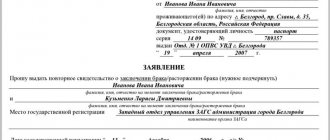The question of whether it is possible to register an inheritance in another city is of interest to a large number of successors who cannot come to the locality where the testator is registered. Article No. 1115 of the Civil Code states that a notary is obliged to open a case according to the last place of residence of the deceased. If the citizen lived abroad, then the heirs must visit the notary’s office in the Russian city where the deceased’s property is located. It is quite difficult to enter into inheritance rights at a distance, but it is possible if you become familiar with the procedure and features of obtaining the property of the deceased.
How to find out about inheritance in another city
To figure out how to enter into an inheritance from another city, you should familiarize yourself with the methods of informing successors. The notary who opened the inheritance case informs the citizen about the need to issue a certificate.
To learn more about the inheritance, you can contact the relatives of the deceased who live in the same city as the deceased. Also, in order to register an inheritance, it is allowed to send an official request to the notary office at the place of residence of the deceased.
Lawyer's answers to frequently asked questions
My father lived in another city. A month ago he died. How can I transfer his property to myself if the documents for the car and land are burned?
This will require making notarial inquiries about the property that your father owned. It will be difficult to do this remotely on your own. Therefore, it is better to hire a representative in the city where the father lived.
My brother lived in Moscow. I live in Krasnoyarsk. I am currently on maternity leave with a small child. Therefore, I cannot personally come to Moscow to register the inheritance. Is it possible to open an inheritance in Krasnoyarsk?
No. The inheritance can only be opened at the place of last registration of the deceased.
Grandfather died. I'm in another city. The will is made in my name. I have the will in my hands. But there is no death certificate. Can I register an inheritance from another city without a death certificate?
Receive a duplicate of the death certificate through the MFC. A will will prove that you are an interested party. Without a death certificate, it will not be possible to open an inheritance case.
Inheritance procedure
To understand how to register an inheritance in another region, you need to study the general procedure for receiving the property of the deceased. First, you need to contact a notary office, draw up an application and attach the necessary documents to it.
The sequence of how to enter into an inheritance in another city:
- Visit a notary office in your locality. There you need to fill out an application, which is certified by a notary. Copies of documents confirming the right to claim the property of the deceased are also prepared and certified.
- Sending documents by mail or transferring them by an authorized person to the notary office at the place of residence of the deceased. In the first case, a person personally takes part in the inheritance procedure, therefore he is constantly in touch with other successors and the notary. If you act through an official representative, then it is enough to issue a power of attorney.
- Obtaining a certificate. The document is issued six months after the death of the testator.
If the deceased has executed a will, then this document must be provided to the notary. When there is no last expression of will, inheritance is carried out according to law and the successor must prove his relationship with the deceased.
Place of opening of inheritance
The inheritance case is registered at the last place of residence of the deceased. If the recipient of the property is located in another city, then he can claim the right to inheritance in three ways. When a person has not yet decided how to enter into an inheritance in another locality, it is recommended that you familiarize yourself with each option and choose the most convenient one for yourself.
Ways to claim rights to the property of the deceased:
- Go to another city . But not every citizen has the financial and time resources to travel and complete all the documents independently.
- Remote option . You can send the completed application and papers by registered mail. An unreliable option, because the package may get lost or arrive later than expected.
- Issue a power of attorney for a third party . The most optimal way that allows you to transfer all powers to a disinterested representative.
If the deceased lived abroad, then the inheritance case is opened at the location of his assets in Russia. A similar situation occurs when the last place of residence of the deceased is unknown. If the property is located in several cities, then the one in which the largest percentage of property is concentrated is selected.
Does region of residence matter?
Ideally, in order to register the rights to the property of the deceased, you need to visit the notary office at the place of his residence. But this option is often quite difficult to implement, since relatives may be in different parts of the country (for example, the deceased is registered in Moscow, and his successor lives in Siberia).
The region of residence does not matter if you fill out the application and prepare the papers correctly. Thus, documents can be certified at a notary office in your city, and then sent by mail. You can also entrust the preparation of all papers to a third party through a power of attorney.
When dividing an inheritance without a will, conflicts often arise, because each relative believes that he is entitled to a larger share than allotted by law. In this case, the heir is recommended to transfer his powers to a trusted person who will control the legality of all actions.
Package of documents
It is important for applicants to the property of the deceased to know not only how to apply for an inheritance, but also how to draw up additional paperwork. Their list may differ depending on the method of inheritance. But in any case, it is necessary to document the rights to inheritance.
List of required documents:
- certificate confirming the death of the testator;
- conclusion on the assessment of the value of the deceased’s property;
- papers confirming the deceased's ownership of assets;
- proof of relationship or will.
An exact list of documents can be obtained from a notary. To complete all the paperwork while living in another region, you need to include the necessary powers in the power of attorney. You can also hire a lawyer who will help you correctly draw up the documentation and send it by mail.
Expenses of heirs
If a citizen registers an inheritance, he must pay state tax. The amount of the fee depends on the degree of relationship with the deceased and the estimated value of the share.
The tax for persons of the first and second lines of kinship is 0.3% of the price of the received real estate, but not more than 100 thousand rubles. Distant relatives are required to give the state 0.6% of the estimated value of assets, but not more than 1 million rubles.
Deadlines for entering into inheritance
To register an inheritance, six months are allotted after the death of the testator. If a person died on 08/01/2019, then the last day for filing an application will be 02/02/2020. If the death of a citizen was established in court, then the countdown begins the next day after the decision was made.
When, after 6 months, someone abandoned the assets of the deceased or did not submit an application at all to issue a certificate, then another 3 months are allotted for the provision of documents by the heirs from the next queues. If a citizen missed the allotted period for a good reason, then he has the right to restore the terms through the court.
Registration procedure without departure
The procedure for registering an inheritance without leaving another city involves all the same stages that successors go through with personal participation. The only difference is the remote interaction with the notary office.
Preparation of papers

Before submitting your application, you must prepare documentation. The notary will need the following documents:
- Heir's passport.
- Certificate confirming the death of the testator.
- A certificate indicating the last place of residence of the deceased.
- Documents on the property of the deceased.
- Conclusion of a property appraiser.
- A testamentary document, if drawn up.
- A receipt certifying payment of the fee to the state.
Collecting all the papers remotely is quite problematic if the heir wants to do it on his own. It is better to use the help of a trusted person.
Compiling and submitting an application
An application for acceptance of inherited property is drawn up in writing and contains the following points:
- Passport details of the heir.
- Personal information about the testator.
- Place and date of death of a relative.
- The desire to accept an inheritance.
- Confirmation of the degree of relationship.
- Information about the will, if it was drawn up by the testator.
- Information about the remaining heirs.
- Information about property left by the deceased.
- Date of writing the application.
- Successor's signature.
You can write the application at home, taking a sample, or draw it up at any notary office. After all, this document will still need to be certified by a notary. Only after this can you send it to a notary from another city in which the inheritance case has been opened.
When should I submit my application?

The application along with the documents must be sent to the notary's office within six months from the day the testator passed away . It is on this day that the lawyer opens the inheritance case and is ready to accept the heirs.
Obtaining a certificate
After 6 months, the notary issues a certificate confirming the existence of the right to the inherited property. If the successor is located in another locality, the document is sent through the post office or transferred to a representative if he has the authority to receive the paper.
Where to apply for inheritance

First you need to determine where to send the application to formalize the inheritance. It must be submitted at the last place of residence of the deceased. This is usually the city in which the citizen spent the most time.
If the testator is a minor child or an incapacitated person, then the place of residence of the official guardians is taken into account. When a citizen is registered abroad, and his property is located in the Russian Federation, then the inheritance case is opened in the locality where the largest amount of real estate is located.
Visit to a notary
There are 2 ways of entering into inheritance - formal and actual. The second option allows you to dispose of the property of the deceased six months after his death. But for this you need to first obtain a special certificate. In this case, you will have to prove your rights to own property in a notary office or in court.
It is safer from a legal point of view to personally submit an application within 6 months after the death of the testator at his place of residence. A package of papers is also collected and submitted to the notary’s office. After six months, the notary issues a certificate.
When problems arise with a personal visit to a specialist (for example, when the heir is in another city), you can issue a power of attorney, according to which a third party will receive material benefits. It is also possible to send documents by mail.
Sending by mail
To send documents for an inheritance in another city by mail, you must first prepare and certify them with a local notary or authorized persons.
Which citizens have the right to certify applications:
- representatives of the municipality;
- embassy workers;
- heads of military units and prisons;
- representatives of the administration of social institutions and health organizations.
It is recommended to send papers in advance to meet deadlines. It is prohibited to impose conditions, correct information or provide false information in the application. You also need to complete and send the necessary papers. But if the documents are restored, then you can send one application. Specialists will accept all certificates later.
Transfer of powers to a third party
In Article No. 1153 of the Civil Code you can find a written clause according to which you are allowed to transfer your powers to a representative by issuing a power of attorney. The document describes in detail all the issues that will be dealt with by the third party.
What powers are allowed to be delegated to an official representative:
- checking the legality of the actions of other successors;
- filing an application;
- ensuring the safety of real estate and movable assets;
- cooperation with banks and other financial organizations;
- provision of missing certificates;
- making payments.
The official representative is a legally competent adult who is not interested in receiving the property of the deceased. It is best to contact a lawyer who knows how to properly prepare documents.
How to draw up a will for an apartment?
You can draw up a will for residential premises by following the general rules of the registration procedure. To do this, be sure to certify the expression of will by presenting the following documents:
- originator's passport;
- certificate of legal capacity (if necessary or desired by the compiler);
- papers for the apartment. They are needed to confirm that the bequeathed home is the property of the testator, and to verify all data about it.
For registration, you need to pay a state fee for certification by a notary. It is 100 rubles.
These documents are required to register privatized housing. If it is cooperative, then you will need a certificate of the paid share.
Information about the heirs is recorded according to the owner.
Rights to inheritance by law or by will

You can claim the property of the deceased on the basis of law or a will. The first option is considered the most common. The priority and share of each legal successor are determined by law and are spelled out in detail in Article No. 1141 of the Civil Code.
According to the law, close relatives can claim the inheritance. In the first line there are husband, wife, children, father, mother. Each successor receives an equal share of the total estate (the total property of the deceased). When the assets are classified as jointly owned, the widower or widow can count on 50% of the community property. At the same time, they can also formalize a legal share of the inheritance mass.
If first-degree relatives refused to enter into an inheritance in another city or place of residence of the deceased, then the property is divided between distant relatives. The second line of kinship includes brothers, sisters, grandparents.
The testator can independently determine the circle of persons and their shares in the inheritance mass if he draws up and certifies the expression of will in advance. You can make a will in another city or even in another country. The main thing is to certify him at his place of residence.
Features of inheritance by will
If the testator makes a will during his lifetime, he will be able to independently determine the claimants for his assets. The last declaration of will must be certified by a notary office to give it legal force.
What information is included in the will:
- information about the successors and the size of the shares that are due to each of them;
- conditions for inheriting assets after the death of the testator;
- list of citizens who are prohibited from claiming inheritance.
Many people are interested in whether it is possible to make a will in favor of friends or colleagues. When drawing up an order, a citizen can transfer his property to any persons, including people with whom there are no family ties. But a will cannot deprive relatives of their obligatory and spousal shares.
Time limits for entering into inheritance under a will
Successors are given 6 months to complete and submit their application. The countdown begins from the day the heirs are announced. This date is set by the notary, which is communicated to all applicants for the property of the deceased.
When do the heirs of the second stage come into inheritance?
Taking into account the existing judicial practice in inheritance cases and current legislative norms, it is not unreasonable to believe that there is a rather controversial issue in determining exactly the moment of entry into inheritance by second-degree relatives.
Such controversial issues include the emergence of the right of inheritance by right of representation among persons of the previous priority.
However, the most common moment is rather the moment when there are still no heirs of the first stage.
It is about all these points that the current legislation tells us. Those. We should remember the main points such as:
- There are no heirs of the previous line, which means the heirs of the next line come in.
Extension of deadlines

If the successor does not formalize the inheritance within six months after the death of the testator, then he loses the right to claim the property of the deceased. Such a decision can be challenged in court. The heir must have a valid reason that prevented him from issuing the certificate on time.
Grounds for renewal of inheritance rights:
- ignorance of the death of the testator and the share of property allocated by the deceased;
- stay in prison;
- health problems;
- long business trips;
- service in the armed forces.
The period for accepting an inheritance can be extended through a court procedure. The issue can be resolved peacefully if all successors give their written consent to the recalculation of shares. But this option is practically unrealistic, because few people will agree to voluntarily transfer their part of the property to a third party.
Who pays off the debts of the testator

According to Article No. 1175 of the Civil Code, successors receive not only the property of the deceased, but also his debts. Debts are distributed among the heirs in the same way as assets.
What obligations pass to successors:
- bank loans;
- debt against receipt to ordinary citizens;
- late payments for utilities;
- unpaid taxes;
- various fines and delays.
If during the life of the testator a loan is issued with guarantors, then after his death it is they who undertake to repay the loan. When the deceased independently paid for the loan, then after his death all obligations pass to the heirs.








